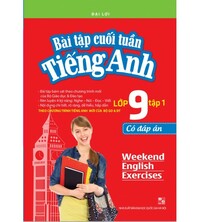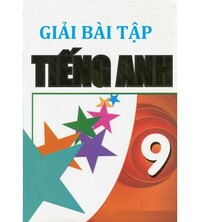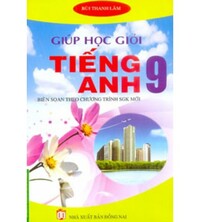Đề thi chọn học sinh giỏi môn tiếng Anh lớp 9
Tìm Đáp Án xin giới thiệu đến các bạn Đề thi chọn học sinh giỏi môn tiếng Anh lớp 9 năm học 2017-2018 (Đề 06) do Tìm Đáp Án sưu tầm và đăng tải dưới đây bao gồm các dạng bài từ vựng, verb form, tìm lỗi sai hay tự luận là những dạng bài hay gặp trong bất kì bài thi nào sẽ giúp các bạn ôn luyện và củng cố kiến thức rất hữu ích.
|
PHÒNG GD&ĐT……….. Trường THCS……….. |
KÌ THI KSCL CÁC ĐỘI TUYỂN HSG KHỐI…. Năm học: 2017-2018 ĐỀ THI MÔN: TIẾNG ANH (Thời gian 90 phút) |
I. Supply the correct verbs form. (10 points)
1. Listen to those people! What language they (speak)_______?
2. Where you (go)_______ if you had a lot of money ?
3. Did you advise him (join)_______ in the talent contest?
4. Who (carry)_______ our bag when we climb the mountains?
5. It (not rain)_______ much in our country in winter.
6. We (make)_______ to work hard last week by the teacher.
7. My brother enjoys (listen)_______ to stories about UFOs.
8. When I got to the station, my pen pal (wait)_______ for me.
9. Nothing (do)_______ since I moved here .
10. To avoid (recognize)_______ the film star wore dark glasses .
II. Fill in each blank with the word in capitals. (10 points)
1. We should use paper as_______ as we can. ECONOMY
2. They live in a_______ area in the north-east of the country. MOUNTAIN
3. His sudden_______ must be a shock to his family. DIE
4. You shouldn’t_______ others if you also have a lot of mistakes. CRITIC
5. There are over 50_______ in the talent contest. COMPLETE
6. Television is one of the cheapest form of_______. ENTERTAIN
7. My teacher_______ me to take this examination. COURAGE
8. The ring is not valuable. In fact, it is almost_______. WORTH
9. I’m full of_______ for my English teacher. ADMIRE
10. That was an_______ remark. It would have been better to keep silent. NECESITY
III. Choose the best answer to complete the sentences. (15 points)
1. When_______ a dictionary, you need to be able to understand the symbols and the abbreviations it contains.
A. having used B. use C. to use D. using
2. How can I know_______ book is yours? They are so alike.
A. what B. which C. this D. the
3. _______ Paul brings the money for lunch, we’ll go right down to the cafeteria.
A. Since B. As soon as C. Now that D. Until
4. If I_______ you, I’d take some rest before the game tomorrow.
A. am B. could be C. were D. would be
5. You have never been to Nha Trang, _______?
A. have you B. haven’t you C. you have D. you haven’t
6. She will visit us as soon as she arrives_______ Paris.
A. at B. in C. on D. to
7. The smaller the room is, the_______ furniture it needs.
A. fewer B. smaller C. more D. less
8. The secretary to_______ I talked didn’t know where the meeting was.
A. which B. who C. that D. whom
9. I find the time of English meals very strange. I’m not used_______ dinner at 5 p.m.
A. to have B. to having C. having D. have
10. I have to be present at eight o’clock and so_______.
A. are you B. have you C. do you D. you do
11. If only I_______ play the guitar as well as you!
A. would B. shall C. could D. might
12. The party, at_______ I was the guest honor, was extremely enjoyable.
A. which B. that C. who D. where
13. Trung swims very well and_______ does his brother.
A. also B. even C. so D. neither
14. _______ people go to soccer matches now than twenty years ago.
A. Less B. Lesser C. Fewer D. Few
15. It’s_______ long time since he last saw his grandparents
A. such a B. so C. very D. too
IV. Combine each pair of sentence using the words in parentheses. (10 points)
1. The man seems very lonely. His wife and children are away. (whose)
2. I recently went back to the town. I was born in that town. (where)
3. The coffee was very hot. I couldn’t drink it. (too)
4. The ice is quite thick. We can walk on it. (enough)
5. The people were very nice. We met them on the train to Ho Chi Minh city. (who)
6. The road was very icy. They couldn’t drive fast. (so)
7. I went to school as usual yesterday. I had a terrible cold. (although)
8. The children ran away. They broke the window. (after)
9. His brother is now working in Liverpool. Liverpool is a big city of England. (which)
10. He cannot speak Chinese. I cannot speak Chinese. (neither)
V. Find and correct mistakes in the following sentences. (10 points)
1. We took part in a six-hours journey to the eastern coast. ……………………………………...
2. Different kinds of newspapers are arranging on the shelves. ……………………………………...
3. There are a little activities that we can do after the meeting. ……………………………………...
4. Hung really wishes that he can take part in the game. ……………………………………...
5. They’re going to get their house to decorate for the Christmas. ……………………………………...
6. I used to sit next to a man who his name is Michael Faraday. ……………………………………...
7. I’d rather typing this letter than write it because it’s faster. ……………………………………...
8. He drives too fast that no one likes to ride with him. ……………………………………...
9. The novel writing by Mark Twain attracts a lot of children. ……………………………………...
10. Thank you very much for your letter, who came yesterday. ……………………………………...
VI. Read the text carefully then answer the questions bellow. (15 points)
How the May Day holiday began in England
Many hundred years ago there were many villages and few towns in England. The villagers liked to go into the forests and the fields when spring came. On the first Sunday of May they usually took a tree back with them and put it in the center of the village. The children dance round it and the men and the women took part in games around it.
Later the international working class made the First of May their day of solidarity.
The first May Day was celebrated in England in 1890, when the workers decided to fight for an eight-hour working day and an end to the very long hours that they worked. In London, the workers marched from all places to a meeting in Hyde Park. This demonstration showed their unity and solidarity.
After that, May Day in England was usually celebrated on the Sunday nearest to the first day of the month. There have been many large May Day demonstrations. The working people showed on those days their solidarity with the progressive people in other countries.
1. Which seasons did the villagers like to go into the forests and fields?
2. Where were the tree put?
3. What did the children do round the tree?
4. When was the first May Day celebrated in England?
5. What did the working people show on those day?
TOTAL:………./70
_________THE END________
Mời các bạn vào tham khảo Đề thi chọn học sinh giỏi môn tiếng Anh lớp 9 năm học 2017-2018 (Đề 07)







